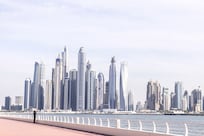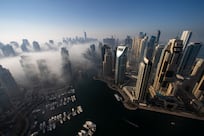The chief executive of one of the world's largest hotel companies has expressed concern that travellers will avoid stable parts of the region including Abu Dhabi, Dubai and Doha, amid serious unrest in countries including Bahrain.
"Quite often there's a misconception and so everybody says 'nobody goes anywhere over there'," said Eric Danziger, the president and chief executive of Wyndham Hotel Group, which has brands including Ramada and is the biggest hotel group globally by its number of properties.
"We know … a customer of ours in Amsterdam who said 'our people are not allowed to go to Qatar or Dubai, they're not going anywhere in the Middle East'. If you know about one who has said 'I'm not going anywhere in that territory', there's likely to be two or three," he said.
Other industry insiders agreed the events could have a negative effect on the UAE's tourism sector.
"We will have to gear up for the fallout of what's happening in Bahrain," said Gaurav Sinha, the founder and managing director of Insignia, a brand communication agency.
"The tourism boards have to gear up to ensure that the UAE is promoted as a safe place to travel to. There is obviously, within Europe, this confusion sometimes that people don't realise the geography of the Middle East and [don't] understand that Libya is actually really far away from the UAE comparatively.
"Definitely we will have to be more aggressive to attract more European travellers."
But Mr Sinha pointed out Dubai had also benefited to some extent from the unrest elsewhere. In recent weeks, the emirate received a big increase in the number of visitors, mostly from Saudi Arabia, who had avoided travelling to Egypt.
Travel agents in the UK, Dubai's largest source market for tourists, said the Japan crisis had overshadowed violence in Bahrain in the media and it was too soon to judge what effect it would have on booking trends to the UAE.
"It will have an impact," said Shane Mallon, the manger of Capricorn Travel in London. "There will be some people who won't go. We've got some people who won't go anywhere in North Africa because of what was happening in Egypt and Tunisia and now with Libya. People do perceive a whole area."
The industry will need to work hard to curtail any concerns among travellers, experts say.
"We should get on the offensive to be sure [the Amsterdam client] was an isolated case and not something that picks up steam and becomes a problem for the region," said Mr Danziger.
Still, he says he is bullish on the region, with Wyndham expanding its brands across the GCC in particular, and looking for more opportunities in Abu Dhabi and Dubai. The company this week announced plans to open a Planet Hollywood hotel in Doha.
Mr Sinha said he believed the region would not be badly affected. "Typically the Middle Eastern market is very resilient to unrest when it comes to travel and tourism.
"We've seen the Iraq invasion, the Kuwait war, we've seen SARS, 9/11, all of these adverse situations come our way," he said.





